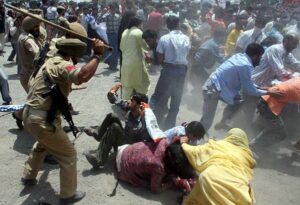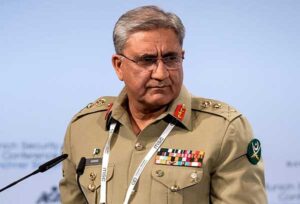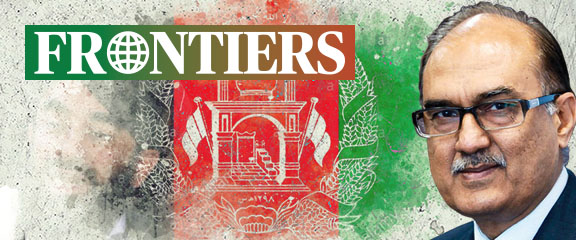Suddenly, things have started moving, and apparently all in the right direction. A ceasefire along the Line of Control, peace offers by Prime Minister Imran Khan and the Pakistan army chief, a positive response by the Indian Prime Minister Narendra Modi, the Pakistani Indus Water Commissioner’s visit to India, a hitherto hostile Bangladesh Prime Minister sending a message felicitating Pakistan on March 23, etc. Now pray this positivity continues. It is a good omen for the one-and-a half billion poverty stricken people of the region. So how did this magic happen?
If history is any indicator, the two antagonistic neighbours have never been able to resolve even their minor issues bilaterally. Thus the ongoing behind-the-scenes cajoling, facilitation, assistance, etc. by assorted national and international players. There are unconfirmed reports of Track Two endeavours, secret meetings of important officials, encouragement by the US and UAE, etc. But whosoever has helped to make it happen, the ultimate credit goes to the leaderships of India and Pakistan for the Great Leap Forward. Now the hope is that enough spadework has gone in to ensure the initiative doesn’t get derailed, as has happened umpteen times in the past.

The National Security Dialogue organised and spearheaded by Special Assitant to the Prime Minister Moeed Yusuf provided the platform — and an appropriate one — for certain important reconciliatory moves by Imran Khan with a follow-up statement by Chief of Army Staff (COAS) General Qamar Javed Bajwa. They both highlighted the real concept of security, ie. the welfare and well-being of the people of this region, firmly anchored in economic and social domains. They stated how a regional approach was likely to work better than isolated development plans for different countries, and that the removal of mistrust and mutual bitterness would be the first and foremost prerequisite for any forward movement in this direction. It was also stressed that people of this region cannot remain hostage to the fossilised, high-handed approach that has been the hallmark of the past. All music to the ears — at least for now.
PM Imran Khan did, however, mention some additional prerequisites for the dialogue between the two neighbours to move ahead. These included the cessation of the atrocities being perpetrated on the hapless people of Indian Occupied Kashmir, along with the reinstatement of their pre August 2019 status. The COAS added: “Bury the past and move forward…” His statement caused ripples in certain circles and raised many eyebrows. This suggestion is unarguably a positive one if it means burying the long-standing mistrust, debilitating military standoff and bitter diplomatic rivalry between the two countries. But there are apprehensions that it may happen at the cost of more Kashmiri suffering, Modi-sponsored demographic changes, and the ever-increasing jingoism of extremist Hindus against the minorities, etc. But if all this has been considered and debated in the spadework, and the cessation of all these activities and attitudes is a given, tacitly agreed upon by all those involved, then it is brilliant work. We now hope that Indian aggression on our western border (Afghanistan), led by their National Security Advisor, also immediately comes to a halt. Pakistan has for a long time amply demonstrated its neutrality in relation to the internal situation and events in the Indian mainland, despite possessing the potential to get involved. We have even shied away from providing any physical support to the Kashmiri struggle which they so richly deserve, as even some UN articles will validate. So from our side, goodwill and concessions had been clearly demonstrated even before the de-escalation that now seems to be emerging on the horizon had seemed possible.

All this aside, what should not and cannot be forgotten are some historical lessons in respect of our oscillating relationships with the US and India. That the American relationship with Pakistan is purely transitive and transaction-based in nature should by now be a well-learned lesson. The US embraces us whenever it suits their interests and as often, maligns us when they have no need for us. It is understood that the US remains wary and suspicious of Pakistan, that they have chosen India as their long-term strategic partner and are not likely to take any step counter to Indian interests. In fact, they will help India to achieve its political goals. However, alongside this, the US recognises that they require us once again to help secure their safe exit from Afghanistan, even while retaining some influence there in some other way (they have multiple choices). For this Pakistan emerges as the most important country. Thus this new wave of attention and assistance. There should be no doubt, however, that, as always, this friendly behaviour will be temporary and ultimately culminate in furthering Indian interests.
The Indian relationship with Pakistan is a story of treachery, backstabbing and deep-seated animosity, all connected with the history of the subcontinent. Why would they behave differently this time? Hope should always be based on some rationale. The actions and utterances of the present political and military set-up across the border graphically indicate their nefarious designs. Any meaningful, positive change in the Modi-led government’s attitude towards Pakistan is highly improbable. So relying on the US or US-sponsored (UAE) assurances about an Indian change of intentions, would be a mistake of monumental proportions.
The main bone of contention between the two large countries of South Asia, is the unfinished agenda of Partition — the Kashmir dispute. Quaid-e-Azam rightly called it the jugular vein of Pakistan owing to its location and main source of our river waters. We have gone to war more than once and a lot of Kashmiris and Pakistanis have laid down their lives as martyrs, fighting for the cause. However, it would be prudent to stop any further bloodshed and look for a solution acceptable to all parties, Kashmiris being the most important and affected entity. How far the Kashmiris on both sides of the ceasefire line are involved in the ongoing parleys, is anybody’s guess. There are no telltale signs of their involvement in the present developments. Any solution, however logical and promising for others, without taking the most affected party on board, will not be tenable and is likely to backfire, creating even larger complications in future. Add to this the large majority of Pakistanis who would support our current Kashmir policy, no matter what the circumstance.
China is our trusted, proven and reliable friend. Hopefully they have been taken into confidence while negotiating about peace in the region and the conditions appended with it. Whatever is related to Kashmir and the region, especially that which involves India and the US, is of immense interest to the Chinese. Keeping them out with the intention of briefing them later, would not be a politically correct step. Surely, they are likely to encourage Indo-Pak rapprochement, but that should not be taken for granted. Pak-China consultations are a must before we embark on such important ventures.
There may be observations that the argument is being stretched too much and a cooling down of Indo-Pak temperatures is only a narrow undertaking with little relevance to the scenarios mentioned above. Unfortunately, everything is so intimately connected that tinkering with one strand will automatically put stress on the others. Thus taking a holistic view is imperative for assessing the probability of success, before embarking on any important political or economic venture that has trans-frontier implications.
It should not be assumed that whatever has been indicated in this article would not have been considered by all those who have worked towards achieving the current positive status quo. But in the absence of information, such discourse is not just inevitable, but necessary.
Let us bury mistrust and antagonism, but not the lessons of history, or the sacrifices of the Kashmiris.

The writer is a former defence minister and defence secretary. He has held major command positions in the Pakistan Army.



